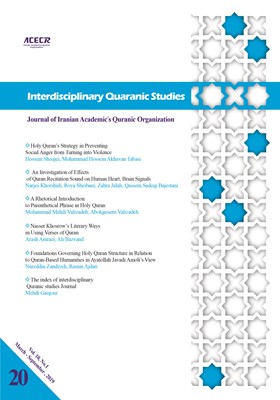Holy Quran’s Strategy in Preventing Social Anger from Turning into Violence
Subject Areas :hosein shojaei 1 * , mohammad hossein akhavan 2
1 - تهران
2 -
Keywords: Quran Anger Violence Social Anger ,
Abstract :
Social anger is a known phenomenon in the world. It is in itself neither positive nor a negative phenomenon. How it is expressed and it effects determine whether it is good or bad. This paper, with a focus on the relation between people and government, tries to determine the boundaries of the negative or positive aspects of expression of social anger and introduce Quranic strategies acting on which can prevent social anger from turning into destructive acts of violence. This paper, written using the library research method, describes positive social anger as one that leads to reforming and improving the conduct of rulers and directing them to the path of accountability and responding to people’s demands. It also describes negative social anger as one that, due to indifference of rulers, turns into violence and involves disintegration of social cohesion and spread of chaos in society. The paper concludes that the Quran’s strategy for preventing social anger from turning into violence can be summarized in four stages and, naturally, if governments act on them, they could avoid facing the consequences (of negative social anger). The four stages are: 1- Allowing criticism and expression of anger; 2- Receiving and analyzing the criticisms meticulously; 3- Having dialogue and humbly accepting faults; 4- Making efforts for reform.
قرآن کریم.
آیتی، محمد ابراهیم (1378). تاریخ پیامبر اسلام. تهران: انتشارات دانشگاه تهران.
ابن عاشور، محمد طاهر (1420)، تفسیر التحریر و التنویر المعروف بتفسیر ابن عاشور، بیروت: مؤسسهی التاریخ العربی.
ابن کثیر (1385). الکامل فی التاریخ. بیروت: دارصادر.
ابن منظور، محمد بن مکرم (1414). لسان العرب. بیروت: دارصادر.
اسدی، علی (1382). مدخل «پادشاهی» دایره المعارف قرآن کریم. قم: بوستان کتاب قم (انتشارات دفتر تبلیغات اسلامى حوزه علمیه قم).
پورفرد، مسعود (1385). قرآن؛ جمهوریت و مردمسالاری. پژوهشهای قرآنی، 13(45)، 144-161.
جادالمولى، محمد احمد (1380). قصههای قرآن. قم: پژواک اندیشه.
جعفری هرفته، مجید (1394). خشمت را قورت بده. قم: مؤسسه آموزشی و پژوهشی امام خمینی.
حکیمی، پریسا (۱۳۹۵). طراحی آموزشی راهکارهای کنترل خشم با رویکرد اسلامی و اثربخشی آن بر کنترل خشم (پایاننامه کارشناسی ارشد). دانشگاه علوم و معارف قرآنی، دانشکده علوم قرآنی میبد.
شریف الرضى، محمد بن حسین (1414). نهج البلاغه (للصبحی صالح). قم: هجرت.
صادقى تهرانى، محمد (1406). الفرقان فى تفسیر القرآن بالقرآن و السنه. قم: فرهنگ اسلامی.
طباطبایی، محمدحسین (1390). المیزان فی تفسیر القرآن. بیروت: مؤسسة الاعلمی للمطبوعات.
کیومرثی اسکویی، محمد رضا (1394). مهار خشم. قم: دارالحدیث.
گنجی، حمزه (1388). روانشناسی عمومی. تهران: نشر ساوالان.
مبارکی، رضا (1391). اثربخشی درمان شناسی رفتاری بر تغییر سبکهای مدیریت خشم (پایاننامه کارشناسی ارشد). دانشگاه کردستان.
متوسلی، محمود و زبیری، هدی (1392). انسجام اجتماعی؛ منشأ توسعه اقتصادی. توسعه محلی (روستائی-شهری). 5(2)، 49-74.
محسنی تبریزی، علی رضا (1374) مبانی نظری و تجربی وندالیسم. نشریه نامه علوم اجتماعی، 16(16).
معموری، محمد جواد (1382). مدخل «اقتصاد» دایرة المعارف قرآن کریم، قم: بوستان کتاب قم (انتشارات دفتر تبلیغات اسلامى حوزه علمیه قم).
مهکام، رضا (1383). «ارتباط واگرا و همگرا». مجلّه حدیث زندگی. 19، 54.
نراقی، احمد (1375). معراج السّعاده. قم: انتشارات هجرت.
واقدی، محمد بن عمر (1369). مغازی تاریخ جنگهای پیامبر (مترجم: محمود مهدوی دامغانی). تهران: مرکز نشر دانشگاهی.
Garnefski, Nadia; & Kraaij, Vivian. (2006). Relationships between cognitive emotion regulation strategies and depressive symptoms: A comparative study of five specific samples. Personality and Individual Differences, 40(8), 1659-1669. https://doi.org/10.1016/j.paid.2005.12.009
Howells, Kevin; & Day, Andrew. (2003). Readiness for anger management: clinical and theoretical issues. Clinical Psychology Review, 23(2), 319-337. https://doi.org/10.1016/s0272-7358(02)00228-3
Leonard, Wilbert Marcellus. (1984). A sociological perspective of sport (2nd ed). Minneapolis, Minn: Burgess Pub. Co.
Nolen-Hoeksema, Susan; Wisco, Blair E.; & Lyubomirsky, Sonja. (2008). Rethinking Rumination. Perspectives on Psychological Science: A Journal of the Association for Psychological Science, 3(5), 400-424. https://doi.org/10.1111/j.1745-6924.2008.00088.x
Victoroff, Jeff. (n.d.). The Mind of the Terrorist: A Review and Critique of Psychological Approaches. 2005), 49(1 (Feb.), 3-42.
Woolcock, M (2011). What Distinctive Contribution Can Social Cohesion Make to Development Theory, Research and Policy?. Paris: World Bank, OECD ConferenceWoolcock, M. (2011). What Distinctive Contribution Can Social Cohesion Make to Development Theory, Research and Policy?. World Bank, OECD Conference, Paris.

